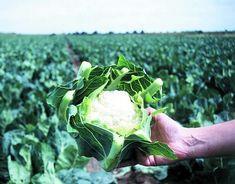
A head of cauliflower in Ireland more than quadruples in price between the time it leaves the grower’s farm and arrives on the supermarket shelf, according to a new survey. The grower gets just €0.50 (26p) for the cauliflower, while the shopper pays €1.55 a head, representing a mark-up for the multiples of 210 per cent.
The supermarkets’ profit margins on other vegetables are equally impressive, with a kilo of carrots earning the grower just €0.58, and the consumer paying €1.65, a 185 per cent mark-up.
The survey was conducted by the main opposition party in the Irish parliament, Fine Gael, using consumer prices quoted by the three major multiples, Tesco, Dunnes and Superquinn, and those paid to growers on the Dublin wholesale market. According to the party’s spokesman on agriculture and food, Denis Naughton, the findings show that both consumers and growers are being ripped off.
“Shoppers need to know why they are not getting a better deal,” he said, “just as farmers deserve to hear why they are not getting a fair price. Huge profits are being made at the expense of both. Retailers, distributors and processors must come clean and explain how they can justify such mark-ups on basic products. We must not allow our farmers to be forced out of existence by large multiples always seeking a lower bottom line while, at the same time, increasing their own margins.”
The survey found that cabbage retailed at up to €1.49 a head, with the grower getting €0.55, a mark-up of 170 per cent. A 10kg bag of Rooster potatoes, worth €4 to the grower, is sold at €8.49, a profit margin of 104 per cent.
The findings could prove particularly embarrassing for the new horticulture minister, Trevor Sergant, who represents the main vegetable-growing area of north Dublin. He has acknowledged that the low prices paid by multiples are threatening the industry, and has pledged to fight for better returns.
However, Retail Ireland, representing the multiples, dismissed the price survey as “grossly misleading”, and said it took no account of business costs such as staff wages, rent, storage, marketing and “the significant wastage of perishables such as vegetables”.



